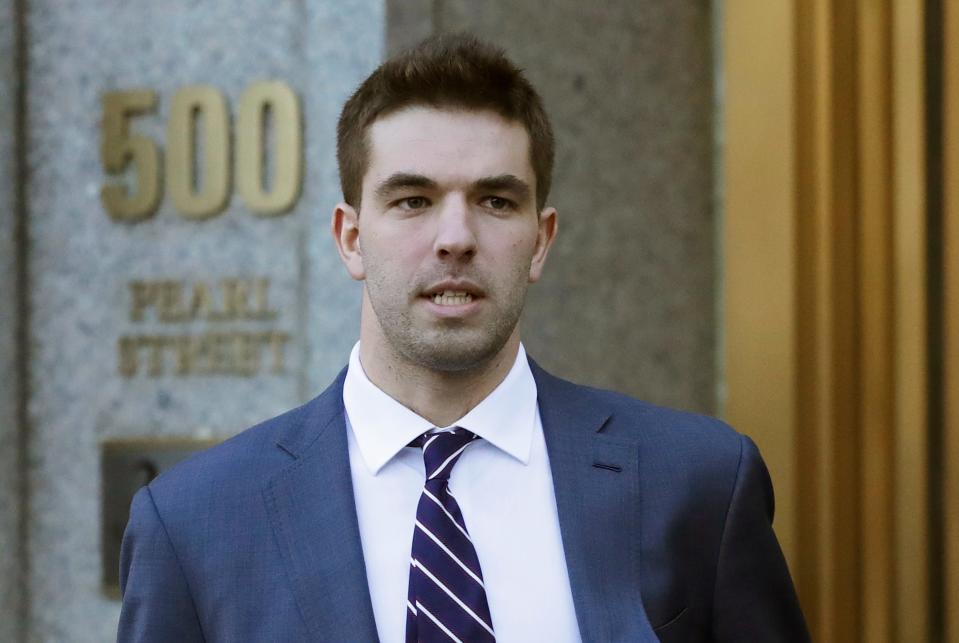After epic failure, Billy McFarland says he's planning another Fyre Festival. Why some can't wait.
Billy McFarland – the founder of Fyre Festival – is trying to (somehow) redeem himself.
"Fyre Festival II is finally happening," McFarland wrote in a tweet earlier this month. "Tell me why you should be invited."
The RSVP list might be sparse: The entrepreneur acknowledged he defrauded investors of $26 million in the 2017 Fyre Festival and over $100,000 in a fraudulent ticket-selling scheme after his arrest in the scam.
So why on earth do people want to see him try again? Experts say we can't look away because of schadenfreude – finding joy in others' hardships – and the ever-tantalizing appeal of a good story.
"Anyone who buys a ticket this time deserves what they get," one Twitter user wrote. "The online schadenfreude will be epic." Another added: "Invite me please I will post the invite on social media and make fun of it."

Why we couldn't look away from Fyre Festival
Social media watched the festival's disaster happen in real time: the gross meals were going viral, people tweeted about the lack of bathrooms and more.
The festival was such a colossal failure that it ultimately led to two juicy Netflix and Hulu documentaries that detailed the behind-the scenes scheme. Viewers ate it up.
That's because some people find pleasure in watching the moments that remind us that the wealthy "really don't have it all," Elizabeth Cohen, an associate professor at West Virginia University who researches psychology of media and pop culture, previously told USA TODAY. "And maybe they don't even necessarily deserve it all."
It's those same factors that are driving interest in Fyre Festival 2.0.
"Love it or hate it, Americans and global audiences alike love to witness celebrity scandals, epic failures and potential resurgences in the media," says Melvin Williams, associate professor of communication and media studies at Pace University. "McFarland’s attempt to revive the Fyre Festival entices enduring public fascination with watching cringeworthy moments unfold for entertainment."
'I'm glad that's not me'
A psychological theory called "social comparison" is behind this, Cohen says. It posits that humans will always try and compare themselves to other people to figure out where they fit in the world. If you perceive someone is "better" than you, you fall into upward social comparison.
"The problem with upward social comparison is that it can be positive, but it makes you feel like you're not where you need to be," Cohen says. "So it can be motivational, but it can also make you feel bad about yourself."
The flip side is downward social comparison, where you consume media solely to look down on others.
"When we see someone fail so spectacularly, like McFarland did with the Fyre Festival, it sways the balance of the comparison scale in our favor," says Regine Galanti, a clinical psychologist. "In a world of social comparison, particularly when something terrible doesn't happen, like death or murder, watching someone getting spectacularly knocked down comparatively lifts us up and (we) feel better about ourselves."
Though both fictional media and watching something unfold in real-time might invoke a similar "I'm glad that's not me" response, knowing something is real might make that reaction more visceral.
'Schadenfreude pleasure' of Fyre Festival
More generally, "we like watching other people behave in strange and bad ways," Robert Thompson, founding director of the Bleier Center for Television and Popular Culture at the Newhouse School of Public Communications Syracuse University, previously told USA TODAY. "We like watching other human beings melt down, regardless of their income status."
It's all part of what makes a good story. "There seems to be a narrative thread that we like watching people make this climb to wealth and status," Thompson says. "But once they actually get there, one of the only narrative threads left is to watch them fall. And we do get a lot of schadenfreude pleasure out of that if you look at a lot of the examples of stories that we tell."
Whatever happens with McFarland, you know people will tune in.
Contributing: Naledi Ushe and The Associated Press
More on schadenfreude, wellness tips
Good question: Marie Kondo’s house is messy. Should you give up on being tidy too?
Yep: Why you can't stop watching rich people disintegrate on 'Succession,' 'Real Housewives'
In case you missed: The Gwyneth Paltrow ski trial has our attention. It's strange, juicy and exactly what the internet wanted.
Celebs: Ben Affleck's face, Reese Witherspoon and Ashton Kutcher's awkwardness and never-ending gossip
This article originally appeared on USA TODAY: Billy McFarland promises Fyre Festival 2. Why people hope he fails

